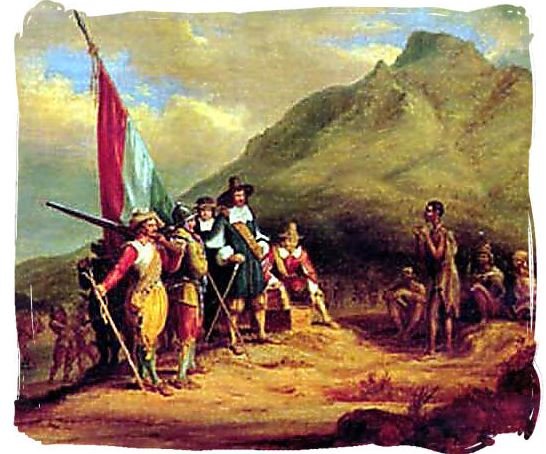Johan Anthoniszoon (Jan) van Riebeeck set off from Texel in The Netherlands on 24 December 1651, for the Cape of Good Hope. Van Riebeeck was sent by the Dutch East India Company (VOC) to establish a settlement to supply Dutch ships on their way to the East.

Van Riebeeck was born in Culemborg in the Netherlands on 21 April 1619. His father was a surgeon and who taught him the trade. In Schiedam, he married Maria de la Quellerie on 28 March 1649. He joined the Dutch East India Company as an assistant surgeon and sailed to Batavia in April 1639. From there he moved to Japan, and in 1645 he was put in charge of the company trading station at Tongking (Tonkin, Vietnam).
After the VOC had discovered that Van Riebeeck was conducting trade for his account, he was recalled back to The Netherlands.
On his voyage back his ship stopped for 18 days at the Cape of Good Hope in Table Bay. Van Riebeeck realised to the potential of the area to produce fresh produce for passing ships. His observation was not unique as many ship's officers made the same recommendation to the VOC.
In 1651 the VOC instructed Van Riebeeck to establish a Dutch settlement at the southern end of Africa.
On the 6 April 1652, he landed at the Cape with three ships; the Reijer, the Dromedaris, and the Goede Hoop.
With him were 82 men and eight women – including his wife, Maria. The Walvis and the Oliphant, the last two ships of a fleet of five ships, arrived later, due to 130 burials at sea.
Van Riebeeck was specifically instructed by the VOC not to colonise the Cape as they had no desire to conquer and the administrate a territory in southern Africa.
The only purpose was to ensure the provision of supplies to their shipping fleets on the route between The Netherlands and the Dutch East Indies. He only had to build a fort and set-up a flagpole for signalling to passing ships.
On Van Riebeeck’s arrival in the Cape, he was met by Autshumao was also known as Herry the Strandloper.
“Strandloper” (beach walker) was the name the Gorinhaikonas Khoikhoi tribe was called by the Dutch. Autshumao acted as an interpreter between the Dutch and other Khoikhoi tribe from whom they later traded fresh produce for the ships. His ability to speak English and Dutch was learned when the English took him to Bantam in 1630 and returned him to the Cape a year later.
The first wet winter in the Cape proved tough for these early settlers, but they survived.
Despite these initial difficulties, the Cape was producing enough fresh food to supply the passing ship by 1659.
With the help of Autshumao, they obtained meat provisions through bartering and trade with the native Khoikhoi people.
Initially, the company employees were not allowed to start local industries, and freedom of commerce was forbidden.
The demand for supplies by the passing ships grew, and the initial garden and trade with the Khoikhoi tribes could not provide enough provision.
Van Riebeeck was already writing reports to the VOC recommending “vry burgers” (free citizens) who could farm and trade for their account and supply the settlement with the needed fresh produces.
In February 1657 the VOC agreed to the arrangement and issued the first permits for farms next to the Liesbeek River.
To meet the labour needs slaves were imported from Batavia and Madagascar.
Van Riebeeck left the Cape in 1662 after he was promoted to Secretary to the Governor-general of the Dutch East Indies. He served there from 1665 until his death in 1677 on the island of Java.
Sources:
http://www.sahistory.org.za/topic/arrival-jan-van-riebeeck-cape-6-april-1652
http://v1.sahistory.org.za/pages/people/bios/autshumao.htm
Hi! I am a content-detection robot. I found similar content that readers might be interested in:
http://v1.sahistory.org.za/pages/people/bios/vanRiebeek,j.htm
Downvoting a post can decrease pending rewards and make it less visible. Common reasons:
Submit
You should consider German colonies. A German explorer, Major Hermann Detzner explored a German Colony for the entire war and flew the Imperial flag until he surrendered after the armistace.
Downvoting a post can decrease pending rewards and make it less visible. Common reasons:
Submit
It surely will be an interesting topic to explore. I shall keep it in mind for my next topic of research - thanks.
Downvoting a post can decrease pending rewards and make it less visible. Common reasons:
Submit